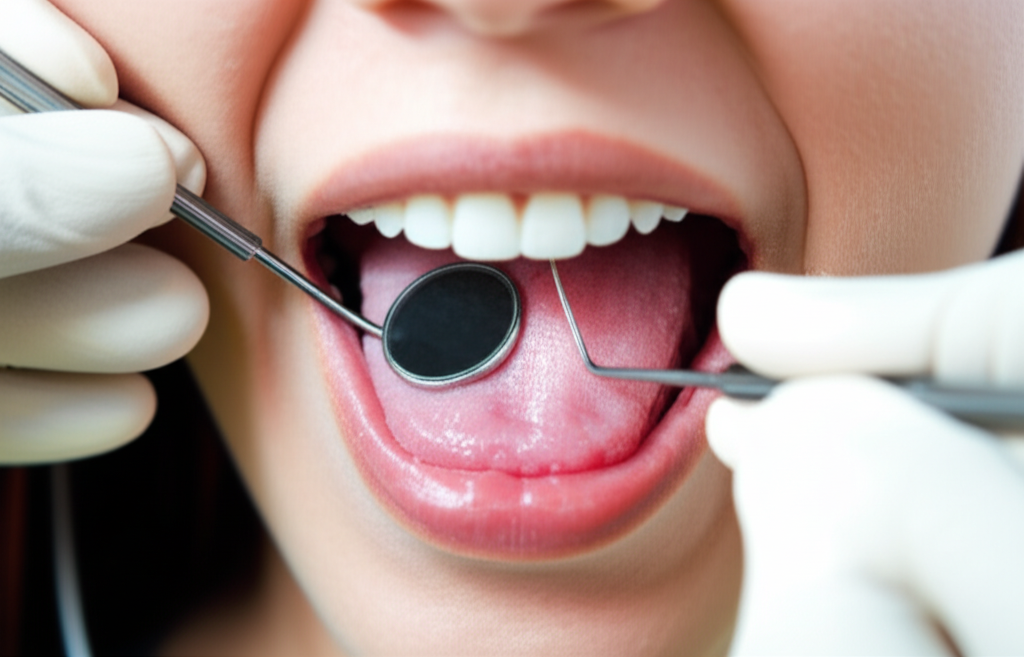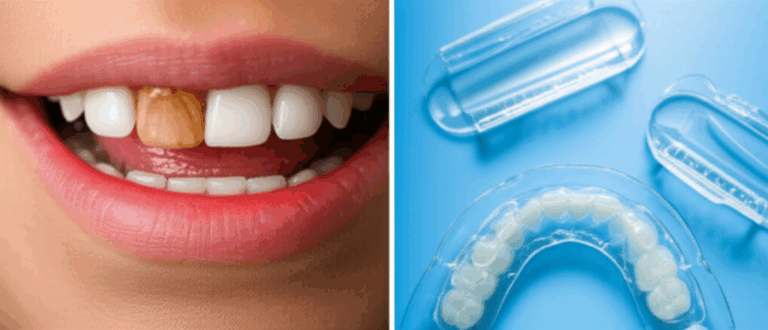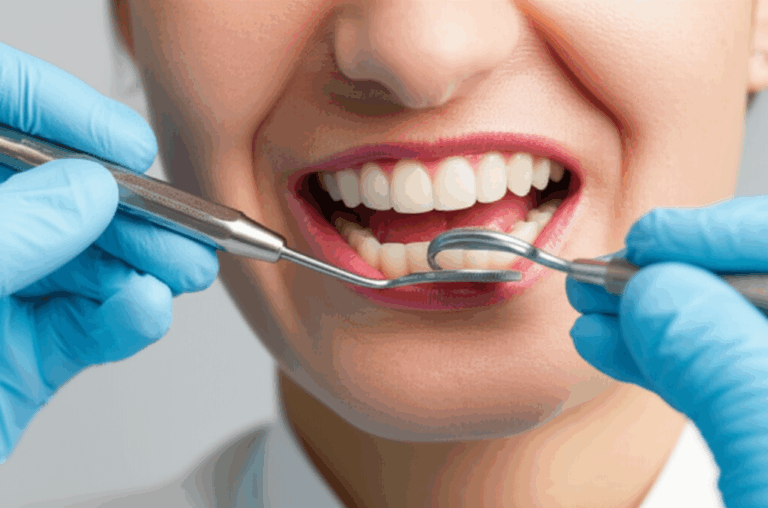
How to Relax Your Tongue at the Dentist: Your Guide to a Calmer Dental Visit
Introduction: “Why does my tongue have a mind of its own at the dentist?”
If you’ve ever felt your tongue get in the way of dental tools or move around during your cleaning, you’re not the only one. Many people have trouble keeping their tongue still at the dentist. It can be embarrassing, make you gag, or make you worry you’re making things harder for your dentist.
Take a deep breath. This is normal and you can fix it. The tongue is a strong, sensitive muscle that naturally tries to protect you. When dental tools or suction come near, the tongue wants to react. That’s just how our bodies work, even if it doesn’t make your appointment any easier.
This guide will tell you why your tongue acts up, how to calm it down in the moment, and what you can do before your dental visit to make things easier. You’ll find simple steps to try right away. You’ll also learn when you might need extra help, like sedation or expert support. The main goal: to help you feel calm, in control, and ready for a stress-free dental visit.
Table of Contents
1. Why Does My Tongue Get So Restless at the Dentist?
Your tongue isn’t trying to make things harder. It’s just doing what it’s supposed to do. Here’s why:
The Natural Gag Reflex
Your gag reflex helps keep you from choking. When something touches the back of your mouth or throat, your body tries to push it away. Dental tools or x-rays can set off this reflex, making your tongue move or making you gag. Some people have a strong gag reflex, others mostly notice it during things like x-rays or molds.
Dental Anxiety and Fear
Stress makes your muscles tighten up—including your jaw and tongue. Being nervous at the dentist can make your tongue feel tight or wiggly. Fast breathing can dry out your mouth, so your tongue moves to find moisture or touch the tools. This is common. Many adults have dental anxiety, and the American Dental Association (ADA) says it’s a real thing and can be helped.
Involuntary Tongue Movement
You don’t have to think about moving your tongue—it just happens on its own sometimes. Saliva, suction, water sprays, or the feel of dental tools can make your tongue react, like your leg jumps when the doctor taps your knee.
Discomfort and Sensitivity
It’s uncomfortable to hold your mouth open or feel pressure on your mouth’s soft areas. That makes your tongue want to move or press against tools. If your tongue is sore or the tissues are irritated, it’s even more likely to move.
Jaw Tension and Swallowing
Keeping your mouth open for a long time can tire out your jaw and mouth muscles. That also pulls on your tongue. Swallowing feels weird with your mouth open and a suction tube in there. Your tongue tries to help, but that just means more movement.
2. Immediate Strategies: How to Relax Your Tongue During Your Appointment
You can calm your tongue right away during your dental visit. Here’s how:
Diaphragmatic (Belly) Breathing
Breathing slowly and deeply settles your body and helps your tongue relax.
Try this:
- Put your hand on your belly, shoulders relaxed.
- Inhale through your nose for four counts, making your belly rise.
- Exhale gently through your mouth for six counts.
- Repeat five to ten times, relaxing your jaw and letting your tongue rest.
Focus Your Eyes or Close Them
Stare at a spot on the ceiling, count tiles, or close your eyes and imagine a peaceful place. Distraction takes your mind off your mouth. You can use slow breathing with this.
Park Your Tongue on the Roof of Your Mouth
Rest the tip of your tongue behind your front teeth, lightly touching the roof of your mouth. Don’t press hard. This keeps your tongue in one place.
Wiggle Your Toes or Fingers
Move your toes or fingers. This keeps your brain busy and takes attention away from your tongue.
Use Hand Signals
Set a hand signal before the appointment. Thumbs up means “I’m fine.” Raise your hand to ask for a break. This helps you feel in control.
Ask for Tools That Help
- Bite block (mouth prop): Keeps your mouth open and jaw relaxed, which helps relax your tongue.
- Tongue depressor or retractor: Holds your tongue away from the dentist’s working area.
- Cotton rolls or gauze: Soft barriers to keep things dry.
- Dental dam: A thin sheet to protect your tongue and isolate teeth during treatments.
- Suction: Ask for a suction tube you can rest your tongue against, or stronger suction to clear spit faster.
Take Short Breaks
Ask for short pauses so you can swallow, reset your tongue, and breathe.
3. Preparation Is Key: Before Your Dental Appointment
Doing simple things before your appointment can help a lot.
Tell Your Dentist About Your Concerns
Say things like:
- “I have a strong gag reflex.”
- “My tongue moves a lot.”
- “I get anxious. Can we use a bite block and hand signals?”
Telling your dentist ahead of time lets them plan for your comfort.
Practice Relaxing at Home
- Belly breathing: Five minutes, twice a day.
- Mindfulness: Pay attention to relaxing your body.
- Guided imagery: Imagine a happy, peaceful place.
- Short meditations: Even two minutes help.
Distract Yourself
- Headphones: Music or a calm podcast.
- Stress ball: Give your hands something to do.
- Weighted blanket: Gentle pressure can calm some people (ask your dentist if you can bring one).
- Aromatherapy: Soft scents like lavender, but always check with your dental office.
Avoid Caffeine and Sugary Drinks
They make you feel jumpy. Drink water and have a light snack instead.
Consider Numbing Sprays or Gels
Topical numbing can help with gagging. Ask your dentist if this is right for you.
Try Simple Tongue and Jaw Exercises
- Tongue stretch: Stick tongue out and move it around gently.
- Tongue roll: Roll your tongue against the roof of your mouth.
- Jaw release: Massage your jaw and cheeks, and breathe slowly.
- Swallow practice: Place your tongue tip to the roof of your mouth when you swallow.
Book Your Appointment at a Good Time
Book when you’re least stressed, like early in the morning or after a good meal. Give yourself time to get there so you don’t feel rushed.
Tips for Kids and Sensitive Patients
- Go to a pediatric dentist if possible.
- Practice at home with “open wide” games.
- Bring a comfort item from home.
4. When to Discuss Advanced Options with Your Dentist
If simple tips don’t work, don’t feel bad. You have more choices.
If Simple Methods Don’t Help
Tell your dentist if gagging or tongue movement is still a big problem.
Sedation Dentistry
- Nitrous oxide (laughing gas): Makes you feel calm. Wears off quickly. You can go home right after.
- Oral sedation: A pill you take before the appointment. Makes you sleepy, so you need someone to drive you home.
- IV sedation: Strong medicine through an IV, used for bigger, longer procedures.
- General anesthesia: For big surgeries or severe anxiety—done by experts.
Behavioral Support
- Cognitive behavioral therapy (CBT): Trains your brain to relax and cope with dental fear.
- Desensitization visits: Step-by-step practice to get used to dental tools.
- At-home practice: Your dentist might have you practice touching your tongue with a toothbrush while breathing slowly.
Smart Tools Your Dentist Might Use
- Smaller x-ray tools.
- Numbing gel on the roof of your mouth.
- Dental dam for fillings or root canal.
- Mouth props for tired jaws.
- High-power suction to pull spit away fast.
- Leaning you forward during impressions.
- A sprinkle of table salt on your tongue’s tip (only if your dentist says it’s okay).
Medical Issues to Mention
Tell your dentist if you:
- Get heartburn or acid reflux.
- Have sleep apnea or a big tongue.
- Have allergies or past reactions to numbing gels.
- Take medicine that dries your mouth.
5. Who Is This For? Good Candidates for These Strategies
These tips can help:
- People with dental anxiety or fear.
- Anyone with a strong gag reflex.
- Anyone getting a cleaning, filling, crown, root canal, dental impression, or tooth out.
- Kids and teens.
- People with tight jaw muscles or TMJ problems.
- People whose tongue is just naturally more “busy” or sensitive.
- Patients with health issues that affect the mouth.
6. FAQs About Tongue Relaxation at the Dentist
Is it normal for my tongue to move a lot at the dentist?
Yes. Your tongue is a strong muscle and moves when you’re anxious or if tools touch it. Calming yourself and parking your tongue on your palate helps a lot.
Can the dentist tell I’m nervous?
Usually yes. Dentists notice things like breathing and how your muscles feel. This isn’t bad—they just want to help.
What if I move my tongue during a filling?
It’s okay. Most dentists expect a little movement and protect your tongue. If you feel uncomfortable, raise your hand.
Can I ask for special tools?
Yes. Ask for a bite block, tongue depressor, different suction, or dental dam if you need it. You can also request numbing gel if you gag easily.
How do I stop gagging during dental x-rays?
Breathe slowly through your nose, put your tongue on the roof of your mouth, and focus your eyes somewhere else. Ask for smaller x-ray tools or numb gel if needed.
What should I do with my tongue during a cleaning?
Keep it on the roof of your mouth behind your front teeth unless the hygienist asks you to move it.
My tongue is sore after the dentist. What should I do?
Rinse with warm salt water, avoid spicy or hot foods, and call your dentist if pain sticks around.
Swallowing at the dentist feels weird. What do I do?
Ask for breaks so you can swallow. Practice tongue-to-palate swallowing at home.
Will sedation stop the gag reflex?
Sedation helps but doesn’t always get rid of it. Your dentist will suggest what’s best.
Does anxiety really make my tongue move more?
Yes. When you’re anxious, all your muscles get more active—including your tongue. Relaxing helps.
Your Options Explained: At-Home Steps vs. In-Office Support
At Home:
- Practice belly breathing daily.
- Try the tongue-to-palate position and swallowing.
- Use calming music or guided imagery.
- Drink water and skip caffeine.
- Stretch your tongue and jaw.
- Pack a comfort kit: headphones, stress ball, or lip balm.
Ask At the Office:
- Talk to your hygienist about tongue/gag issues.
- Use hand signals for breaks.
- Try a bite block or dental dam.
- Ask for suction to keep spit from the back of your throat.
- Numbing spray if you need it.
- Take short, regular breaks.
- Try music, a blanket, or nitrous oxide for comfort.
When Home Tips Don’t Help:
If nothing works, talk to your dentist about bigger options like sedation or CBT. There are ways to make things better.
Where This Comes Up Most:
- Dental x-rays: Ask for smaller tools and breathing tips.
- Impressions: Lean forward and breathe through your nose.
- Cleanings: Park your tongue and use breaks.
- Fillings/root canals: Dental dam and mouth prop can help.
- Surgery: Ask about sedation ahead of time.
If you need a crown or bridge, your dentist may work with a high-quality crown and bridge lab to help the procedure go faster and smoother. If you have trouble with clenching, ask about a custom night guard (made through a night guard dental lab). For surgery or dental implant care, always talk about comfort plans early.
Your Healthy Takeaway
- Restless tongues are normal at the dentist.
- Calm your nerves with slow breathing to relax your tongue and jaw.
- Park your tongue gently on your palate.
- Use simple distractions.
- Ask for help: bite block, dental dam, suction, and breaks.
- Prep before your appointment.
- Higher support is okay if you need it—nitrous oxide, sedation, or therapy are all options.
Clear Next Steps
Selected Resources
- ADA: Patient info on dental anxiety, sedation, and safe care
- Guidelines: On safe sedation in dentistry
- CBT: Studies on using therapy to lower dental fear
Remember: Your tongue isn’t being bad—it just needs some coaching. With the right breathing, a few helpful tools, and a caring dental team, you can relax your tongue at the dentist and leave feeling calm and confident.








